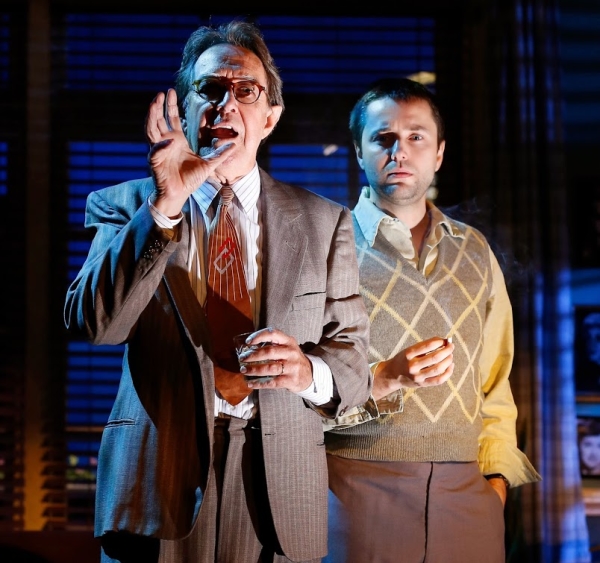Billy & Ray
Television pioneer Garry Marshall directs a new comedy about the creation of the film ”Double Indemnity”.

(© Carol Rosegg)
When Billy Wilder directed Double Indemnity in 1944, he coined a new idiom: film noir, a style characterized by expressionistic lighting, dark shadows, and disillusioned, morally ambiguous characters. One would think this landmark occurrence would provide the basis for an eye-popping theatrical experience, but in the hands of playwright Mike Bencivenga, only the surface elements are explored.
Billy & Ray is the name of Bencivenga’s comedy drama, which comes to the Vineyard Theatre after a run at the Falcon Theatre in Burbank, California. The Billy is obvious; the Ray refers to Raymond Chandler, the detective-fiction novelist hired to help turn James M. Cain’s pulpy novel of love, lies, and murder into the screenplay that would get around Hollywood's decency codes. Chandler (played here by Larry Pine) had very few demands. All he asked for was a thousand dollars up front and sole authorship. When he returned with a script deemed impossible to shoot by Wilder (Vincent Kartheiser, of Mad Men), they were forced to collaborate together against Chandler's wishes.
It was a contentious pairing, one that allegedly drove Chandler back to alcoholism. Onstage, though, they look more like Felix and Oscar in an extended episode of The Odd Couple, that great sitcom created by Billy & Ray's director, television legend Garry Marshall. The British-American Chandler is presented as a stuffy intellectual who corrects everyone's grammar; the Austrian-born Wilder is a slovenly womanizer with no regard for other people's feelings.
Bencivenga's script is loaded with dialogue clearly aimed at getting laughs from the film-obsessed (for example, Wilder misquotes the title of The Postman Always Rings Twice as The Postman Came in the Back Door), and true to Marshall's background, the actors pause for chuckles (which didn't easily appear at the performance I attended). It's harder not to question the errors of continuity, namely how could Chandler, who confesses early on that he's never written a script in his life, suddenly be familiar enough to sprout off expressions like "cut to"? A few scenes about Chandler's struggle with alcoholism and Wilder's concern for his family in Nazi-occupied Europe seem jarring in this otherwise lighthearted evening.
With a sturdier director, perhaps Kartheiser and Pine could have escaped the lack of heft within Bencivenga's portrayal, but Marshall has them playing archetypes. Kartheiser's Wilder becomes a petulant child with an unconvincing Viennese dialect; Pine merely seems as unsteady as Chandler (both were stammering over lines at a recent performance). Supporting player Drew Gehling is all nerves as the Pepto-Bismol-swigging producer Joseph Sistrom, while Sophie von Haselberg, a dead ringer for her famous mom, Bette Midler, makes a serviceable off-Broadway debut as Helen, Wilder's beleaguered secretary.
The design elements contribute a similar amount of sloppiness. Charlie Corcoran's set, depicting Wilder's massive office on the Paramount Pictures back lot, looks expensive until one of the actors slams a door too hard and the whole thing shakes. The costumes by Michael Krass are largely unflattering — also, why does von Haselberg have seven different outfit changes while Gehling and Pine wear the same suit in every scene? Perhaps Marshall thinks he's making a witty joke about film noir when Russell H. Champa's lights dim to form shadows every time Wilder and Chandler discuss a scene from Double Indemnity, but it isn't executed well-enough here to work.
Dramatizing the creation process is notoriously difficult, and even the best authors among us have tried to make two people sitting around writing look interesting and failed. We can applaud Billy & Ray for its intentions to honor one of the most important films of the last century, but given its place in the cinematic canon, it deserved far better.









